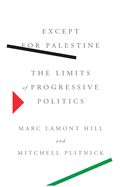Welcome to the latest edition of the “Cutting Through” newsletter. Please let your friends, colleagues, and anyone else who might be interested know about this newsletter. I promise it won’t be boring!
I will also keep my readers informed about the publication of my first book, which I have co-authored with Prof. Marc Lamont Hill. It’s called Except for Palestine: The Limits of Progressive Politics. It will be published in February 2021, by The New Press. You can pre-order the book right now by clicking here.

Here’s the description of the book: “In this major work of daring criticism and analysis, scholar and political commentator Marc Lamont Hill and Israel-Palestine expert Mitchell Plitnick spotlight how holding fast to one-sided and unwaveringly pro-Israel policies reflects the truth-bending grip of authoritarianism on both Israel and the United States. Except for Palestine deftly argues that progressives and liberals who oppose regressive policies on immigration, racial justice, gender equality, LGBTQ rights, and other issues must extend these core principles to the oppression of Palestinians. In doing so the authors take seriously the political concerns and well-being of both Israelis and Palestinians, demonstrating the extent to which U.S. policy has made peace harder to attain. They also unravel the conflation of advocacy for Palestinian rights with anti-Semitism and hatred of Israel.
“Hill and Plitnick provide a timely and essential intervention by examining multiple dimensions of the Israeli-Palestinian conflict, including Israel's growing disdain for democracy, the effects of occupation on Palestine, the siege of Gaza, diminishing American funding for Palestinian relief, and the campaign to stigmatize any critique of Israeli occupation. Except for Palestine is a searing polemic and a cri de coeur for elected officials, activists, and everyday citizens alike to align their beliefs and politics with their values.”
Marc and I wrote a book from a unique perspective on this issue. It’s accessible to people who are new to the complexities of Israel-Palestine politics and will still be thought-provoking, informative, and interesting for people who are steeped in the issue. Hopefully, by February, we will all be reading it through the lens of a new, less fascist U.S. administration and an energized progressive base.
So, sign up for this newsletter below, so you can keep up to date about the book, and about all my work.
THE LATEST FROM MITCHELL
In the latest episode of the ReThinking Foreign Policy Podcast, recorded on October 4, I took a deep dive into the controversy over Alexandria Ocasio-Cortez’s decision to pull out of an Americans for Peace Now event commemorating the 25th anniversary of the assassination of Yitzhak Rabin.

I think much of the debate around this misses a key point. Ask yourself why AOC would agree to appear in the first place. She would do it because she is not better educated on Israel-Palestine than most reasonably well-read Americans who have no particular interest in this issue. As a result, Yitzhak Rabin probably appeared to her as an icon of peace. When she looked deeper and saw how Rabin is viewed by the overwhelming majority of Palestinians who are not old-time leaders of Fatah, she saw a different picture and backed off.
It’s no more controversial than that, but, of course, it’s Israel-Palestine so everything is a minefield. But, as usual, the vitriol from all too many sources clouds reasoned debate and discussion.
The far more pertinent question that I investigate in the podcast is the omission of this Palestinian view of Rabin. The acceptable parameters of debate on his legacy are very narrow, especially if one discredits the far-right view of those who helped incite his murder, represented today by the Likud and those farther right. And discredited it should be.
We are left with a debate between those who would hold Rabin up as a heroic peacemaker who paid for his decisions with his life and those who would still call him a hero but would paint a somewhat more nuanced picture that included the harm he did. In short, it is a debate whose parameters are still being set by the pro-Israel community, albeit this time by the dovish wing, and it still excludes the views of Palestinians.
I understand why so many people from the liberal Zionist crowd were upset about this perceived snub of Rabin and, more to the point, of them, but we’re not going anywhere good on this issue until the parameters of legitimate debate include the views of the majority of Palestinians. This debate, right now, does not.
In the same podcast, I also looked at a pet peeve of mine that Joe Biden triggered in the debacle that I guess we must still call the first presidential “debate” of 2020. That peeve is the reduction of issues like racism, misogyny, antisemitism, islamophobia, homo/transphobia, etc. to matters of bad language and hurt feelings.
It’s not that those things aren’t important, but all too often they take up all the space in the discourse. Part of the reason for that, in my view, is that those are matters that are much easier for white people to deal with. We can address them without sacrificing our privilege, but when it comes to issues that might cost us something, our attitudes too often change. I explain further in the podcast. Check it out.
And if that discussion interests you, check out my article on the subject that I posted on October 4 on the High Crimes and Misdemeanors blog. In a piece with the admittedly less than clever title, Racism Is About A Lot More Than Hurt Feelings, I dive in even further.
I suppose I should make it clear, given that it’s only four weeks until the election, that this is NOT a critique of Biden, he just reflects something that I see quite often, and I use his words in the debate as a starting point.
Thoughts on some current events
Trump and Covid-19
It feels like a requirement that I say something about Trump’s despicable performance since his positive test for the coronavirus. But what more is there to say that others haven’t said already? It seems redundant and dull to call Trump narcissistic, irresponsible, reckless, and completely apathetic to the health of even his closest staff.
There is one point that I think bears some examination. Both mainstream and liberal media have noted that Trump’s whole approach to his own illness has not done him any favors in terms of the election. Most, at least those that I’ve heard, attribute Trump handling it in the manner he has to his fear of showing weakness.
Certainly, that’s true. It’s a well-established aspect of his personality, but it doesn’t fully address his motivation here.
Let’s set aside the fact that literally ANY other politician, let alone one who rose all the way to the presidency, would be able to turn a sudden illness to their advantage with ease, while Trump has turned it into a fiasco. I find it hard to accept, even with Trump’s well-known terror of failure, that he’s suddenly forgotten how to read the room he read pretty well in 2016, much less that he’s willing to just accept a political setback at this late stage.

No, I believe this performance, along with his “strategy” at the debate and many other actions in recent weeks, indicates that Trump believes he is going to lose the election, and his sole focus now is on contingencies.
Most important, Trump will need significant backing among the populace, so he needs to assert himself more strongly as the leader of the MAGA cult. The one thing that has been a constant over these recent weeks is that, whether his actions have been relatively popular or not, they have hardened his base.
Voting Trump out is crucial, for many reasons. But I don’t think that alone will be enough. An atmosphere of terror, combined with legal challenges to be decided by a stacked Supreme Court, a Department of Justice that is badly compromised, and a great many angry police officers all over the country, may well mean having to fight for what democracy we have in the United States.
And we can’t do that through representatives or with proxies. If it comes to that sort of scenario, we are all going to have to stand up and be counted and counted upon to do whatever we can.
Nagorno-Karabakh Entanglements
Since I noted the growing conflict in Nagorno-Karabakh in the first newsletter, the situation has declined sharply. Violence has escalated quickly, both sides have been credibly accused of targeting civilian sites, and the rhetoric from not only Armenia and Azerbaijan, but also other powers with interests in the conflict has grown more belligerent.
Turkey strongly supports Azerbaijan, a country it considers an ally, while it has a long and bloody history of antagonism with Armenia. The Assad government in Syria, unsurprisingly, supports Armenia, which also has a defense agreement with Russia, which could pull Moscow into the conflict. More on that momentarily.
Iran borders both countries, and has relations with both, but has usually leaned towards Armenia in the past. Ethnic Azerbaijanis have a large presence in Iran, however, and Iran is keen to walk their tightrope, while in the public sphere there are growing calls for the government to support Azerbaijan.
Meanwhile, the United Arab Emirates, which seeks to thwart Turkey’s regional ambitions, is drawing closer to Armenia. And, while Saudi Arabia has stayed quiet on this matter, they share the same desire to block Ankara as the UAE.
Armenia just withdrew its ambassador to the UAE’s new BFF, Israel, a few days ago because of massive Israeli arms sales to Azerbaijan. Turkey and Israel taking the same side in a regional conflict is quite fraught at the moment. Only last week, Turkish President Recip Tayyip Erdogan sought to assert himself as the Middle East’s primary advocate for the Palestinian cause, blasting Israel and the Arab states establishing relations with it (although Ankara still maintain relations with Israel despite the intense strain on them over the past decade), and asserting a deep connection to Jerusalem, based on the many centuries of Ottoman control of the city.
Russia very much wants to de-escalate this conflict. They have a defense pact with Armenia, but also have a relationship with Azerbaijan. This relationship was strained back in 2008 when Moscow was sending arms to Armenia, and Russia does not wish to see a repeat of that incident. They are also working closely with Iran elsewhere in the region, especially in Syria, and that gives them even more incentive to quell this flareup.
That said, Russia is also bound to support its ally. All in all, Moscow is very motivated to calm this conflict, but over the past few years have been unable to make progress on a permanent solution and, now are compromised in their diplomatic efforts.
Confused yet?
It’s a major tangle, and bitter history has shown us that such tangled webs are inherently unstable. If they collapse, the consequences are greatly magnified due to all the parties involved. This is actually a place where a competent US administration could make a real difference, as it did in 2016. The Trump administration has largely ignored the issue, aside from a huge increase in military aid to Azerbaijan as part of their attempt to pressure Iran. That didn’t help.
Trump may not have anything like the invasion of Iraq on his resume, but there are many ways in which his obtuse, self-serving, and bankrupt foreign policy has shed enormous amounts of blood in other ways. This could be turning into one of them.
Thanks for reading the newsletter. You can always offer feedback or comments:
And, please, if you find this as interesting as I hope you do, encourage your contacts to sign up. Thanks for reading, and “see you” next week.




